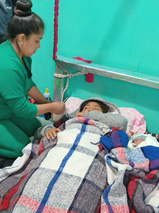An emergency that could have been prevented
Posted: January 10, 2024
During her pregnancy, Juana faithfully attended the local government health post for prenatal check-ups. The comforting assurances from the government staff filled her with hope, believing that she and her baby were on the path to a trouble-free delivery. However, the tranquility shattered when Juana arrived in labor at the Casa Materna at 4 am—her baby was in the breech position.

The nurses swiftly discerned the critical nature of the situation and engaged in a poignant conversation with Juana, her family, and her traditional birth attendant (a midwife, or in Spanish, comadrona). Their urgent plea to transfer Juana to a higher-level facility echoed in the room, where a potential cesarean section could save both lives. This revelation left Juana and her family bewildered, as they had been consistently assured by government nurses that a hospital delivery was unnecessary.
The following three hours unfolded as a heart-wrenching struggle for the family, torn between conflicting advice. The nurses, their empathy palpable, tirelessly advocated for the hospital option, resorting to an ultrasound to visually demonstrate the baby’s position to the family.
Ultimately, the family reluctantly conceded, initiating the costly process of arranging Juana’s transport to the hospital. Meanwhile, time pressed on, and Juana’s labor continued, escalating anxiety among the staff who keenly felt the weight of the ticking clock.
Just as the vehicle arrived to take Juana and her family the 4 hours to the hospital, the baby decided it was time to make her entrance. Rushed into the Casa Materna’s delivery room, the birth unfolded with heartbreaking suspense until the pivotal moment when the baby’s head encountered an obstruction. Despite the nurses’ unwavering efforts, the baby emerged twenty minutes later, seemingly lifeless, with only a faint heartbeat.
In a desperate race against time, the nurses poured their experience and expertise into reviving the limp newborn. Their resuscitation efforts, coupled with tender stimulation, gradually coaxed signs of life from the infant. An hour later, the baby exhibited encouraging responses, stabilizing enough to be gently placed in her mother’s arms.
For the nurses at the Casa Materna, this emotional rollercoaster marked by the triumph of life over adversity serves as a profound source of both heartache and inspiration. The collective relief and joy that accompany the successful recovery of mothers and newborns from such perilous childbirth complications fuel an unyielding commitment to continuous skill-building within their teams, ensuring the provision of the most compassionate and high-quality services to those in need.
Hear from expert Nurse Alma about the values behind the Casa Materna approach championed by Curamericas Global.
Share this Article
Stay Up-To-Date With Curamericas Global
We will not spam, sell or otherwise misuse your information!